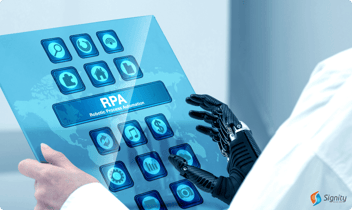What is Open Source RPA? The Technology Made Clear
In the world of workflow automation, open-source RPA tools are the new constant. From saving efforts and costs to offering flexibility and customization, here’s how open-source tools benefit your business.
-1.webp?width=670&height=445&name=ezgif.com-gif-maker%20(45)-1.webp)
Automation is Making Team More Efficient and Life Easier
In today’s digital landscape, automation is everywhere.
Moreover, businesses are constantly looking for ways to automate their process and maximize productivity. So, if you are interested in unfurling the benefits of automation for your business, and have followed our work at Signity, then you would be aware of “RPA” and “open-source RPA”.
Long and short, "RPA” stands for “Robotic Process Automation”, and it can be integrated across organizations - different domains and departments, from accounting to HR to sales - saving time and capital.
So, how can you leverage RPA? What is the difference between RPA and open-source RPA? Why should you consider an open-source platform? These are some of the unskippable questions we’ll be answering in this blog.
Let’s delve!
💡 Key Takeaways
|
First and foremost, let’s start with the basics - “open source technology”?
What is Open Source Technology?
Before we step into the nitty-gritty of open-source RPA, it's important to discuss open-source technology.
Open source technology, aka open source software, refers to openly distributed program code that affects how an app or program functions. And, with easy access to software source code, software developers and programmers can add features, improve on utility and optimize the program in question.
By now, you probably would have guessed and coined the definition of open source, right?
Still, for a quick rundown and easy handhold, it's the opposite of closed-source software, also known as licensed software. Open source software is software with source code that anyone can inspect, alter and change.
Though the biggest myth about open source is that it equals free, that's not always the case.
There are plenty of examples of free, open-source software, including Linux (a popular, incredibly customizable operating system alternative to Windows and macOS), Mozilla Firefox, and LibreOffice (a free alternative to Microsoft Office).
But what are some examples of open-source technology you would have to pay for? Unreal Engine is one; you can use their open-source technology to build your own video game, and it's only free to use up to a certain point: if you wish to make revenue from the game (aka employ it for commercial use), you then need to pay Unreal Engine royalties. Robocorp offers a similar model: we offer free tools to build robots, but our consumption-based pricing takes effect when you want to put the robots to work.
Let’s Have a Quick Recap of RPA
As you know, Robotic Process Automation (RPA) helps businesses automate manual, multi-step tasks that are repetitive and voluminous. Plus, RPA automates these tasks by creating software bots that understand, mimic and improve human actions within or across apps.
The best part - the tasks are accomplished faster and with minimal mistakes
But, you may ask, how much faster?
Well, RPA has the capability to minimize your organizational and administrative costs by 30-50%. Interesting, right?
There’s more:
- Reduce expensive errors.
- Doesn’t take off
- Can be present at multiple places at once
- Potential to scale easily
Therefore, it reduces your overhead cost and increases your bottom line in one fell swoop.
What is Open Source RPA?
As the name suggests, Open Source RPA is a development approach that allows anyone to see, change, and distribute the source code for an RPA tool. This clearly means that businesses can personalize and extend open-source RPA tools to address specific needs without the need to pay for proprietary software licenses.
So, is open-source RPA useful for businesses?
Let's see!
For those interested, open source RPA offers to uncover the benefits of RPA, a strong foundation to create own customized bots without having to engage with a commercial service provider whose technology stack offers limited potential and high upfront costs.
For example, at Signity, we offer RPA developers an extensive tech stack and tools, documentation, and support to develop bots that cater to evolving business needs. And, like many other open-source platforms, our developer's community contribute to the keywords, libraries, and sample bots that others can use.
What is the Difference Between RPA Tools and Open Source RPA Tools?
Both RPA tools and open-source RPA tools are software programs that automate repetitive tasks. Though, there is a subtle difference between the two.
For small and mid-sized companies, the cost is a challenge (in some scenarios with freemium solutions). Whereas, for big organizations, open source bridges the gaps that commercial products may not address.
RPA tools are conventionally proprietary software that is built and sold by a single provider. Often, they are designed to be easy to use, even for users who are rookies to technical skills. RPA tools offer an extensive array of features, circumscribing the ability to automate tasks across numerous apps, the potential to interact with multiple data sources, and, lastly, the ability to be integrated with other business processes.
Whereas open-source RPA tools are developed and maintained by a community of users. Often, they are a little more complicated than RPA tools, but they offer great flexibility and customization.
Not to forget, open-source RPA tools are free to use, but they do need some expertise in technical skills to use them effortlessly.
|
Features |
Commercial RPA Tools |
Open Source RPA |
|
Cost |
Proprietary software, requires a license fee |
Free or low cost |
|
Complexity |
Easy to use, anyone can use it |
More complex, expertise in technical skills is needed to use it |
|
Flexibility |
Less flexible, typically designed to meet specific tasks |
More flexible, can be customized to cater to specific needs |
|
Support |
Often, offered by the vendor |
May not offer the same level of support as RPA tools |
What Benefits Does Open Source RPA Brings to Your Business?
Undoubtedly, open-source RPA is a well-defined choice for two types of businesses:
- The one who has started exploring the possibilities of RPA
- Those who know RPA and its advantages for their business or have given up on RPA projects.
Integrating RPA the old way, 9 out of 10 RPA projects fail, and despite the business type, navigating the route of open-source RPA can put your project back on track.
Talking about the newbies on square one, open-source RPA tools offer a relatively low-expense and low-risk way of exploring RPA. They don’t need to contract with a vendor; they can use sample code and other developer resources to create robots for their specific use case.
When considering the second group, robotic process automation has curated itself as the forerunner. These businesses have likely found that licensed software bots are too brittle and confining, or the platforms are either too restrictive or expensive. Plus, they know that they can scale their RPA process to other areas of business easily by using open source and adding on their own optimization and features.
If you are still sitting on the fence about making a decision, it’s important to understand the significant benefits open source RPA brings to your business:
-
It’s a STEAL!
For most small and mid-sized businesses, licensing a complete RPA tool may sound expensive, especially if they are only starting to understand the benefits of software bots. Simply put, open-source RPA is a minimal-risk way of getting started with RPA, particularly if you have a strong development team on your hands.
-
It’s Customizable
Open-source RPA tools are easy to edit and customize, meaning you can easily create the optimal software robot for your specific use cases. Whereas on the contrary, proprietary platforms have pre-built automation that is daunting to edit and implement.
-
It’s Flexible, More Flexible
There’s no question that open-source RPA can be easily deployed in instances where licensed RPA doesn’t make sense. For example, businesses that look to automate numerous financial reports at the end of every quarter may not want to get locked into long-term contracts for a service they merely use four times a year.
Here, open-source RPA comes to the rescue with its flexibility to only use bots when you require them.
In Nutshell…
There is mammoth potential pocketed within open-source RPA. And the best part about these tools is that they can develop an open framework for users to combine with numerous tools to innovate.
Moreover, as part of modern technology, everyone should adapt to these open-source RPA tools in automating their business processes. So, don’t hesitate; just jump on the bandwagon with us and leverage the most open-source RPA tools to amplify your business productivity.
Frequently Asked Questions
Have a question in mind? We are here to answer.
What is an open-source automation tool?
![]()
An open-source automation tool is a free software application for use, modification, and distribution. Plus, these tools are designed to automate various tasks in software development, testing, and deployment.
Which tool is in demand for RPA?
![]()
There are numerous RPA tools that are in demand, such as TagUI, UiPath, etc.
What are the best open-source RPA tools?
![]()
A handful of the best open-source RPA tools are UI Vision, Liberty RPA, etc. These tools are completely open-source and designed to make automation easier.
Is there a free RPA?
![]()
Yes, there are some RPA tools like Taskt, Liberty RPA, and Open RPA offer free versions of their tools. Those are enough to automate your business processes to some extent.
Is UiPath open-source or not?
![]()
Yes, UiPath provides an open source tool that offers Robotic Process Automation (RPA).


%201-1.webp?width=148&height=74&name=our%20work%20(2)%201-1.webp)


.png?width=344&height=101&name=Mask%20group%20(5).png)








.jpg?width=352&name=Top%20Open-Source%20RPA%20Frameworks%20(2).jpg)







